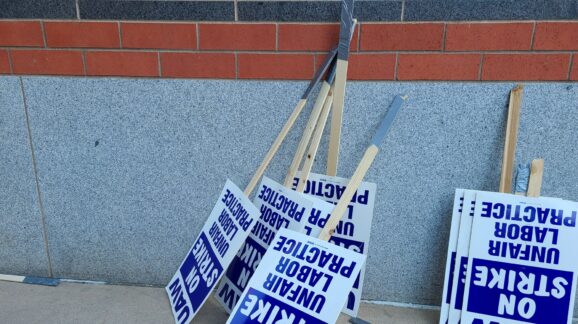The NLRB’s Orwellian ‘Fair Choice – Employee Final Voice Rule’

Photo Credit: Getty
The National Labor Relations Board (NLRB), the federal agency that oversees union elections, has a funny idea about what constitutes giving employees an honest say in forming a union. A new rule it issued late last week, dubbed the “Fair Choice -Employee Final Voice Rule,” eliminates the right of employees to insist on an election to verify that they genuinely support the union their employer has struck a deal with.
The rollback reflects both the current NLRB’s pro-union slant and the broader labor movement’s distrust of worker choice. Chair Lauren McFerran is a former Senate staffer for liberal lion Ted Kennedy. Member David Prouty is a former attorney for the service industry union, UNITE HERE. Member Gwynne Wilcox is a former attorney for a Service Employees International Union local. The council has one Republican member, Marvin Kaplan, a former House committee staffer. The board operates by majority, with Kaplan regularly outvoted.
McFerran’s term expires at the end of the year. The Biden administration has renominated her, and Senate Democrats on the Health, Education Labor and Pensions committee are attempting to fast-track her approval. Extending her term would ensure Democrats retain a functioning majority on the quasi-independent board until at least 2026, and possibly until 2028, even if likely presidential nominee Kamala Harris should lose in the fall.
As much as unions and their allies talk about giving workers a voice, they usually oppose workers having the right to hold their unions to account.
The “Fair Choice – Employee Final Voice Rule” is a case in point. Prior to the rulemaking, if an employer had voluntarily recognized a union – that is, if management did not insist on a federally-monitored workplace vote to verify that their workers supported the union – the workers also had a 45-day window to request a workplace election. This prevented situations where management struck a behind-closed-doors deal with the union that the workers didn’t favor.
This right wasn’t invoked often. For one thing, it wasn’t easy to trigger. It required 30 percent of the workers to sign on to the request, and unions usually aren’t forthcoming about informing workers this is an option. Yet in about 25 percent of the instances where such an election was held, the workers rejected the union that had claimed to have their support. You’d think that that would prove that rule was a useful failsafe measure to prevent workers from being saddled with a union that doesn’t represent their wishes. The current NLRB thinks otherwise and scrapped the 45-day rule.
The board explained the rule change in true Orwellian fashion, arguing that the old rule was unfair because it permitted challenges “without evidence that the recognized union… had not been freely chosen.” Freely chosen by whom? Management? Well, yeah: The whole point of the rule was to provide definitive evidence of who the workers actually supported. Otherwise, the potential for fraud exists.
The board argued that workers’ majority support could be assumed from the fact that unions usually present cards supposedly signed by the workers as part of the recognition process. But there is only the union’s say-so that the cards are legitimately obtained. If the cards are indeed legit, then a workplace election would merely confirm that. If not and the vote shows the workers do not support it, then there’s clear proof that the union was lying. Either way, only a workplace election can provide the necessary clarity.
McFerran thought this was an unnecessary bother. Rolling back the rule would, she argued, “ensure a fair process for workers to choose whether they want representation, and provide a better foundation to allow collective bargaining relationships to thrive.”
It’s an intriguing notion of what’s fair for workers or what gives them a final voice. The Senate committee should allot more time to getting McFerran to explain this before extending her term as NLRB chair.